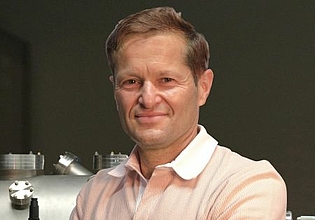News | Tuesday, 3 October 2023
Ferenc Krausz awarded Nobel Prize in Physics 2023

Image: Peter Seidel
Physicist and member of the German National Academy of Sciences Leopoldina, Ferenc Krausz, is being honoured with the Nobel Prize in Physics. Krausz receives the award jointly with Pierre Agostini (France) and Anne L'Huillier (France) for their research on electron behaviour in ultrashort pulses of light. Krausz is considered the founder of attosecond physics, which observes and researches ultrafast movements of electrons in real time. New fields of study, such as the high-resolution microscopy of living organisms, have emerged based on his research. He also developed laser-based technologies that may be used in the diagnosis of ophthalmic diseases and cancer.
Leopoldina President Gerald Haug congratulates Ferenc Krausz on the Nobel Prize in Physics: "I am very pleased that our member Ferenc Krausz is being honoured with the Nobel Prize for his pioneering research. This award recognises groundbreaking findings in the field of attosecond metrology, which allows serious diseases to be studied in a completely new way."
Ferenc Krausz and his team successfully generated and measured an attosecond light pulse for the first time, with an attosecond being one billionth of a billionth of a second (0.000,000,000,000,000,001 seconds). Krausz uses these attosecond light pulses for real-time tracking of electron movement in atoms and molecules. He and his team have also developed the laser systems and components that make such observations possible. Electrons move at a speed of about a thousand kilometres per second. In these laser systems, the attosecond flash acts like an extremely short photo flash and freezes the movement at a certain point in time. The researchers around Ferenc Krausz were thus able to measure the time it takes for an electron to cross the atomic shell: between seven and twenty attoseconds. The exact velocity depends on the electrons' interactions with each other and the atomic nucleus.
At high intensities, attosecond light pulses can free electrons from their atomic bonds and accelerate them to velocities approaching the speed of light. This opens the door to high-field attosecond science. By combining different lasers, Ferenc Krausz intends to build a petawatt field synthesiser (PFS) that will be able to generate light pulses in the petawatt (one quadrillion watts) range. This would allow the processes within atoms to be visualised in even greater detail. With the tools he developed, Ferenc Krausz succeeded in real-time observation of fundamental electron processes such as charge transport mechanisms, quantum tunnelling and the photoelectric effect. The techniques can be utilised in the development of quantum computers and superconductors. Other fields of applications include medicine, for example, the early detection and treatment of malignant tumours. Laser-based particle therapies are not only more gentle than conventional radiation therapy, they are also more precise.
Krausz has been director at the Max Planck Institute of Quantum Optics in Garching near Munich since 2004, professor of experimental physics - laser physics at Ludwig Maximilian University (LMU) Munich since 2004, founding director at the Centre for Advanced Laser Applications (CALA) at LMU Munich since 2015, director at the Laboratory for Extreme Photonics (LEX-Photonics) also in Garching near Munich since 2012 and director at the Center for Molecular Fingerprinting Research in Budapest, Hungary, since 2019. For his scientific achievements, the physicist was awarded, among others, the Wolf Prize in Physics in 2022, the Vladilen Letokhov Medal in 2019, the János Arany Award for Outstanding Scientific Performance of the Hungarian Academy of Sciences in 2018, the Otto Hahn Prize in 2013 and the Gottfried Wilhelm Leibniz Prize of the German Research Foundation in 2006. The German National Academy of Sciences Leopoldina elected Ferenc Krausz as a member of its Physics Section in 2016.
The Nobel Prize in Physiology or Medicine is currently endowed with a total of eleven million Swedish kronor (equivalent to around 949,000 euros). All Nobel Prizes are traditionally bestowed on the laureates on 10 December, the anniversary of founder Alfred Nobel’s death.
The Leopoldina has around 1,700 members, with a current 38 Nobel laureates among them.
